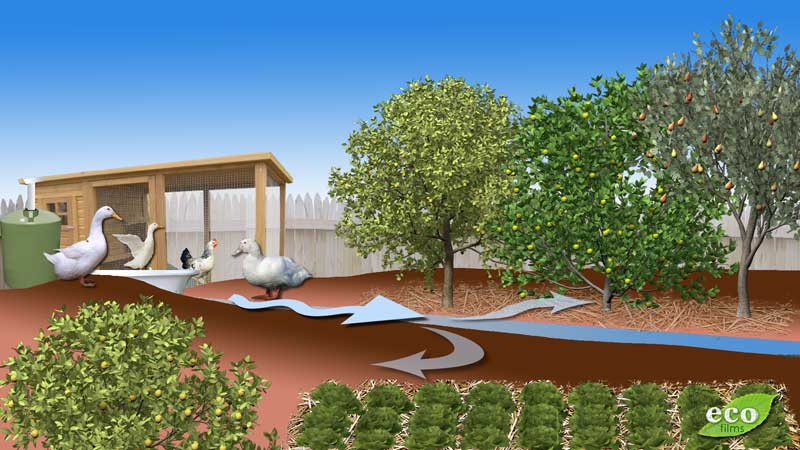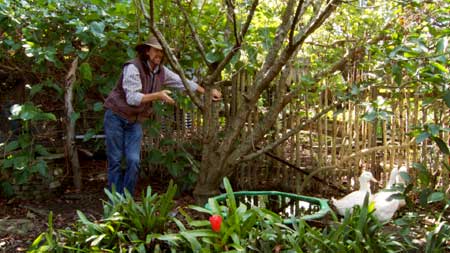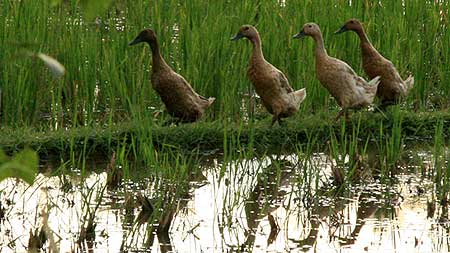Using Ducks in the Urban Garden
They say nine out of ten people that ultimately get ducks into their gardens first started off with chickens. So what are the advantages of keeping ducks?
The popular perception or myth is that ducks need a large expanse of water; they make a lot of mess; destroy your garden and their eggs are large and oily.
But that’s not necessarily the case.

Urban Permaculture: Excess water collected from the duck coop is diverted down a swale channel to feed the garden
Its true domestic ducks do like to spend 10% of their time in water but the duck pond can be replaced with a child’s plastic paddling pool or even an old spa bath found out the local rubbish dump if you limit your ducks to just a few per household. Ducks love to attack snails and slugs and will keep the garden free of most insect pests. They’ll do less damage to your garden than chickens but will enjoy nibbling on young fresh seedlings so limit their activities around the backyard by netting new garden beds or at least fencing the ducks off from sensitive garden areas.
Duck eggs are larger than chicken eggs and the yolks are larger as well. Their eggs are well suited for baking and contain more calories than the average chicken egg.
Recently when filming with Geoff Lawton The Urban Permaculture DVD we came across a number of ducks in a small urban backyard where the owner had used excess rainwater harvested in a tank from the roof of the coop and directed the water to flow into an old recycled spa bath that had now become a duck bath.
Ducks would swim in the tub and naturally muddy and fertilize the water.
Excess water from the duck bath would flow down a small swale system that the owner had cleverly built. The duck nutrient would flow, soak into the mulched beds and feed the fruit trees grown on either side of the channel. With some clever planning and minimal energy use the owner managed to organize her garden into a soak that caught free nutrient flow – all powered by the activities of ducks. Its not rock science at all. But many people can’t make the obvious connections when it comes to harnessing relationships between animal systems and vegetable needs.
Sometimes the more simple the idea – the better it works. The ducks have a small tub to fertilize the water and that runoff with nutrients is diverted to an orchard of fruit trees. Economical and an efficient use of a simple concept is a good example of permaculture design.
Ducks are beneficial to the environment too. There is some evidence that they can reduce the amount of methane gas production in rice paddy fields due to their paddling around, rooting for grubs and stirring up the water!
Of course ducks in the rice paddy are not new concepts.
In his book “The Power of Duck” Takao Furuno writes about his life as a rice farmer in Japan.
He had been struggling with his fight against weeds in his organic fields. Recognizing his problem as an opportunity, he started thinking of the weeds, bugs and snails in his fields as duck food, turning his problems into a solution.
He ended up with a bounty of rice – thanks to the ducks helping to aerate the water with their paddling and their ability to gobble up snails and nibble at the weeds and fertilize his rice plants. Takao got the added benefit of tasty duck meat at the end of his journey.
Sometimes a little creative planning is all thats needed to enable a successful outcome and ducks are just one animal system available to the clever permaculture designer.








I agree with this post actually – we started off with chickens and ducks then became an addition – they are less messy than chickens and have not destroyed my garden unlike the chickens! The ducks eggs are certainly bigger and stronger in flavour.
This article is delightful!
I would be interested in more information on how the rainwater – duck pool – watering system was put together! I’m planning to raise ducks in my (relatively small, urban) yard, starting this summer, and the idea of capturing rainwater and then being able to use the duck runoff (without having to lug a kiddie pool full of water around) really appeals to me!